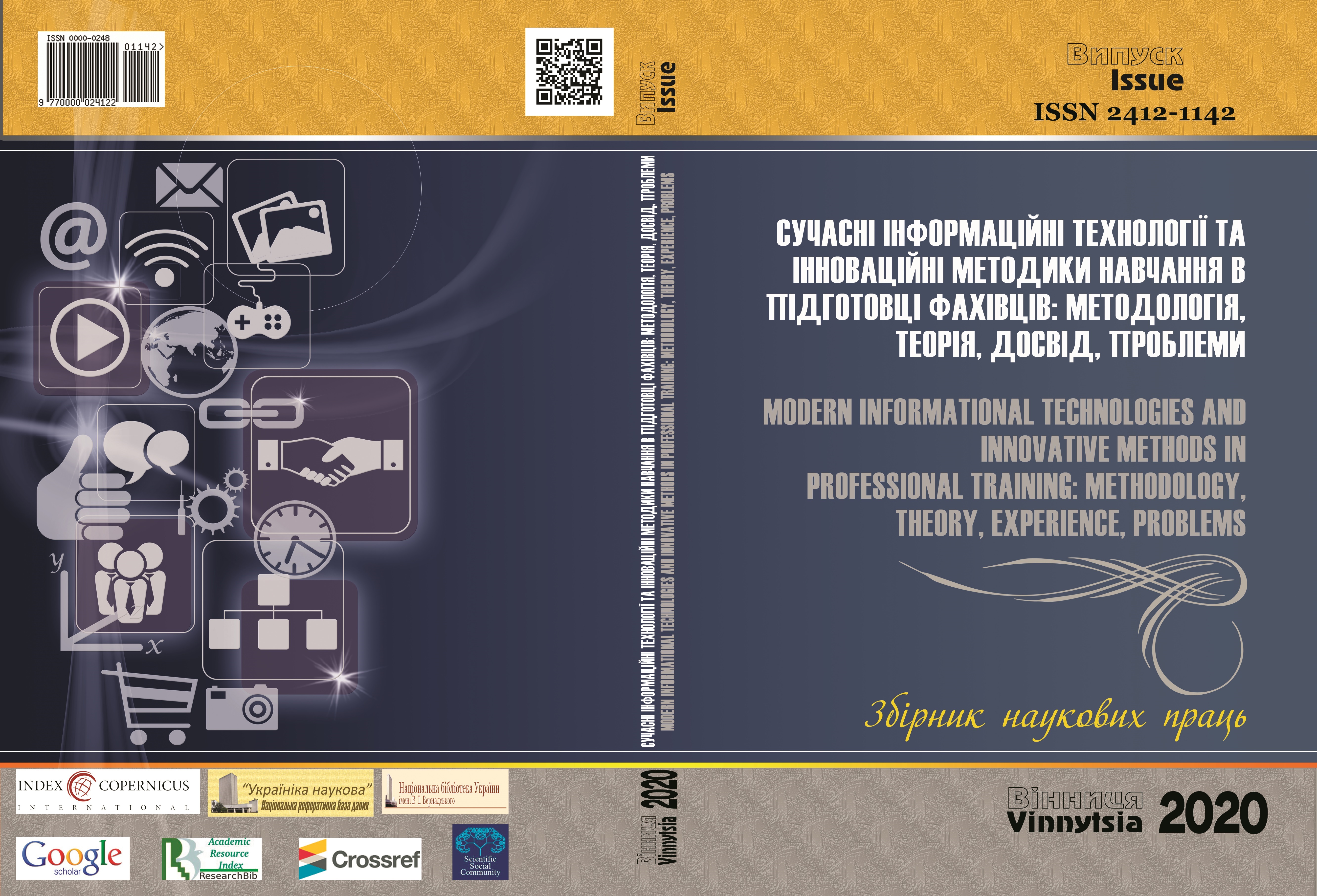INDIVIDUAL PSYCHOLOGICAL DIFFERENCES IN THE INNOVATIVENESS OF TEACHING STAFF
DOI:
https://doi.org/10.31652/2412-1142-2020-57-164-173Keywords:
innovativeness, innovative sensitivity, personal readiness for innovative pedagogical activity, innovative focusAbstract
The materials presented in the article are devoted to an urgent problem for developmental and educational psychology - the development of innovativeness of teaching staff. After all, the significant socio-economic phenomena occurring in modern Ukraine require teachers to have an appropriate level of psychological readiness of the individual to implement the ideas of developing education on innovative principles. The Concept "New Ukrainian School" states that the school should be at the forefront of social change, and its graduate should be an innovator capable of changing the world around him, developing the economy, competing in the labor market, and learning throughout life.
The content of this article presents a methodology for self-assessment of the professional innovative culture of a teacher, developed to identify the levels of development of innovativeness of pedagogical workers, as well as to build a psychological profile of the personality of an innovative pedagogical worker. Together with this methodology, in an empirical study of the innovativeness of pedagogical workers in institutions of general secondary, out-of-school, vocational, higher, postgraduate education, expert survey procedures, content analysis, diagnostics were used using a set of standardized psychodiagnostic techniques.
The purpose of the article was to identify differences in the structure and levels of development of innovativeness of teaching staff. In the process of completing the research tasks, individual psychological differences in the innovativeness of pedagogical workers qualified in specialties in the field of natural, humanitarian and physical and mathematical sciences were revealed, the result of which is the determination of their personal psychotypes (optimist, pessimist, realist, dreamer, critic, pedant) based on differences in communicative properties, peculiarities of interpersonal interaction, emotional-volitional characteristics, intellectual properties revealed among the studied teachers.
Downloads
References
Балл, Г.О. (2006). Творчість як атрибут культури і особистості. Проблеми і напрями розвитку особистісної
готовності педагогічних працівників та учнів професійного ліцею до творчої та інноваційної діяльності, К.:
ІПППО АПН України та УПТО ГУОН КМДА, 19–26.
Ігнатович О.М. (2018) Психолого-технологічні аспекти розвитку фахової інноваційної культури педагогічних
працівників, Психологічний часопис, 4 (14), 68-86. DOI: 10.31108/2018vol14iss4pp68. URL:
https://www.google.com/search?client=opera&q=https%3A%2F%2Fdoi.org%2F10.31108%2F2018vol14iss4pp68-
&sourceid=opera&ie=UTF-8&oe=UTF-8
Ігнатович О.М. (2019) Психологічні основи розвитку фахової інноваційної культури педагогічних
працівників. Дисертація на здобуття наукового ступеня доктора психологічних наук за спеціальністю
00.07 – педагогічна та вікова психологія. – Інститут психології імені Г. С. Костюка НАПН України. – Київ.
URL: http://repository.ldufk.edu.ua/bitstream/34606048/21861/1/ignatovich_disertaciya_compressed_2019.pdf
Ігнатович О.М. (2019) Психологічні основи розвитку фахової інноваційної культури педагогічних
працівників. Автореферат дис. на здобуття наукового ступеня доктора психологічних наук за спеціальністю
00.07 – педагогічна та вікова психологія. – Інститут психології імені Г. С. Костюка НАПН України. – Київ.
URL: http://psychology-naes-ua.institute/files/pdf/avtoreferat_ignatovich_1556732803.pdf
Капустина В.А., Быкова, Е.С. (2019). Типологический подход в исследовании структуры инновационного
потенциала личности. Психолог, 4, 14-26. DOI: 10.25136/2409-8701.2019.4.30548. URL:
https://nbpublish.com/library_read_article.php?id=30548
Лазарев В.С. (2004). Педагогическая инноватика: объект, предмет и основные понятия, Педагогика, 4,16.
Поліщук С.П. (2015). Психологічні складові професійного самовизначення особистості, Науковий вісник
Херсонського державного університету, 5, 51-55. URL: http://nbuv.gov.ua/UJRN/nvkhp_2015_5_11.
Федорова, В.А., Татарчук, Ю.І. (2015). Теоретичні відомості з питання інновацій. Економічний простір, 100,
-73. URL: http://nbuv.gov.ua/UJRN/ecpros_2015_100_9
Хуторской, А.В. (2005). Педагогическая инноватика: методология, теория, практика. М.:УНЦ ДО, 222.
Godin, B. (2017). Models of Innovation: The History of an Idea. Cambridge, MA: MIT Press. URL:
https://www.kobo. com/us/en/ebook/models-of-innovation
Kumar, M. Bharadwaj, A. (2016). Psychology of innovation: innovating human psychology. Technological and
Institutional Innovations for Marginalized Smallholders in Agricultural Development, DOI: 10.1007/978-3-319-
-1_4
Tidd, J., Bessant, J. (2013). Managing Innovation: Integrating Technological, Market and Organizational Change
(5th ed.), London: John Wiley & Sons Ltd,. URL: http://bookfreenow.com/download/tidd-bessant-managing-
innovation-5- edition/
Downloads
Published
Issue
Section
License
Copyright (c) 2021 Modern informational technologies and innovative methods in professional training: methodology, theory, experience, problems

This work is licensed under a Creative Commons Attribution 4.0 International License.





